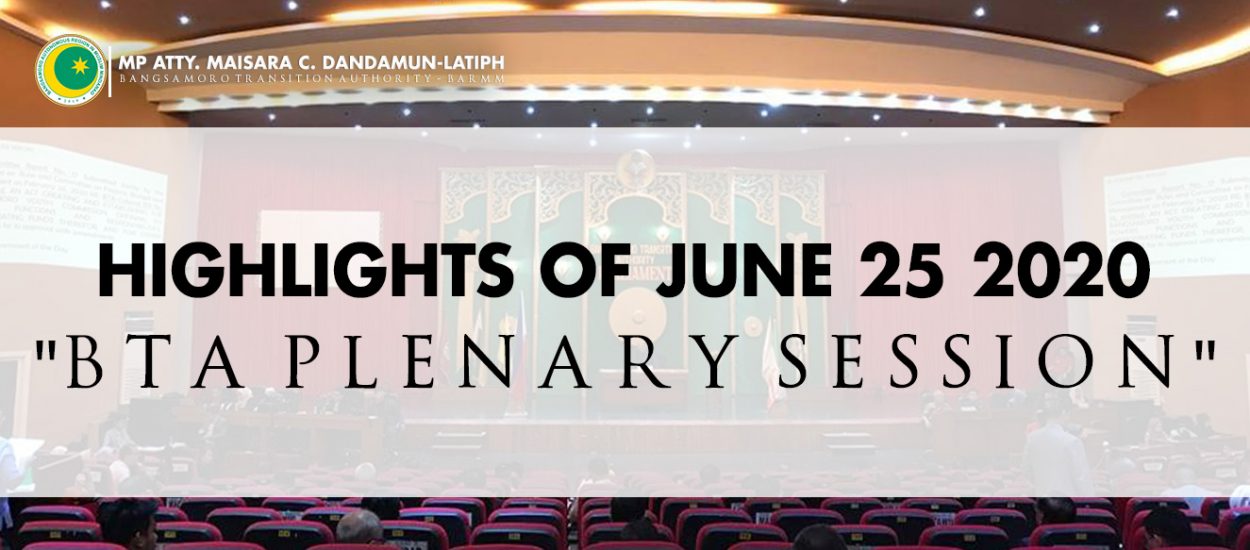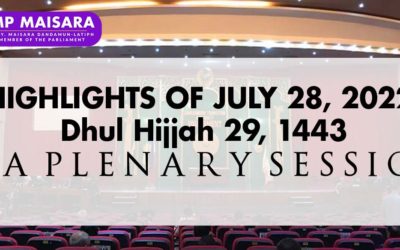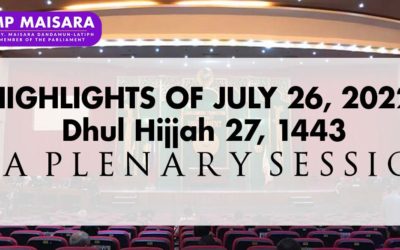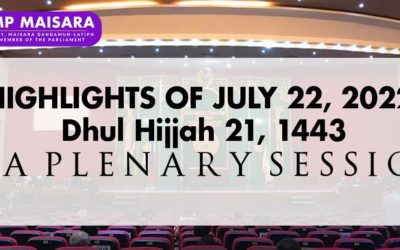READ | HIGHLIGHTS of the BTA Parliament Session on June 25, 2020
✅ PRIVILEGE SPEECH OF THE BTA SPEAKER HON. PANGALIAN BALINDONG
His speech is entitled “A Difficult Balancing Act: A Reading of the Proposed Anti-Terror Law”
The BTA Speaker Mr. Balindong see the Anti-Terror Law as a difficult balancing act. The government has to ensure the security of the country and the people and at the same time to ensure that the rights of everyone is respected, that there is no discrimination, religious persecution or socioeconomic or social class discrimination. He is sure that everyone in the Bangsamoro understand the tremendous responsibility and challenge to the government in this regard.
According to him, we ourselves have been at the fringes, and we understand fully well how it is to be ignored, sidelined and even insulted. We know the nasty feeling when the government avoids dealing with us then and so we can only sympathize with those who remain in the fringes and fighting for what they think is right and there is no reason for us not to hear them and even commiserate with them.
On the other hand, it the duty of the Bangsamoro government to give a more objective perspective, especially now that we are one with the government in ensuring a good life for the people. We should say yes, agree and support anything that the administration prefers to do and pursue, sit idly by and not pay serious attention to complaints and serious allegations of abuses of government. Again, there is no reason why we would not understand or feel exactly how it is to be abused and ignored by government. It is Bangsamoro responsibility however as part of government to contribute in ensuring that the kind of policies and programs proposed and implemented are appropriate and consistent with the laws of the land and standards of religion and morality.
The Bangsamoro have to contribute in the discussion of the important proposed issue and legislation that is the Anti-Terror Law now in the advanced stage in both houses of Congress. There has been so much but unfortunately, the speaker is not sure how much of this public discourse have been well informed and balanced views. And so, it took time for him to sit down and come up with this pronouncement. As one of the leaders of the Bangsamoro, he has to be very careful and objective with what he is going to say and propose.
So much has been raised against the proposed extended detention under the provision of warrantless arrests in the proposed law. This is found in Section 29 of the proposed legislation on Anti-Terrorism. He quoted that many rights groups have raised hell as it provides.
The provisions of Article 125 of the Revised Penal Code to the contrary notwithstanding, any law enforcement agent or military personnel, who, having been duly authorized in writing by the ATC (Anti-Terrorism Council) has taken custody of a person suspected of committing any of the acts defined and penalized under Section 4, 5, 6, 7, 8, 9, 10, 11 and 12 of this Act, shall without incurring any criminal liability for delay in the delivery of detained persons to the proper judicial authorities, deliver said suspected person to the proper judicial authority within a period of fourteen (14) calendar days counted from the moment the said suspected person has been apprehended or arrested, detained, and taken into custody by the law enforcement agent or military personnel. The period of detention may be extended to a maximum period of ten (10) calendar days.
This is of course followed by provisos as to why additional 10 days are needed. Now, this can immediately raise serious concerns and indubitably agitate as it raises fears for many Bangsamoro. Imagine getting detained for a lot more than what is allowed under existing law and as safeguarded by the Bill of Rights. The Speaker emphasized that we should not read this as a standalone provision.
The immediately following paragraph of the afore cited provision provides that “Immediately after taking custody of a person suspected of committing terrorism or any member of a group of persons, organization or association proscribed under Section 26 hereof, the law enforcement agent or military personnel shall notify in writing the judge of the court nearest the place of apprehension or arrest of the following facts: (a) the time, date, and manner of arrest; (b) the location or locations of the detained suspect/s and (c) the physical and mental condition of the detained suspect/s..” This means that the required judicial procedure is not entirely done away with. On the other hand, what has to be considered is that the word “immediately” does not provide a specific time to comply. The Speaker asked if informing the judge after say 8 days still qualify as “immediately” informing the judge or the court for that matter.
What is at least reassuring for the Speaker is that the immediately succeeding section, no. 30 provides for the “Rights of a Person under Custodial Detention”. It is provided that the detainee should be informed of his rights including the right to a lawyer, specifying that if the detainee cannot afford a lawyer, he shall be provided one either from the free legal assistance of the Integrated Bar of the Philippines (IBP) or the Public Attorney’s Office (PAO) and that such contacted lawyer is to be asked to “immediately visit the person/s detained and provide him or her legal assistance.” The rights of the detainee cannot be waived unless in writing and in the presence of his/her counsel of choice. Again, this provision reassures that the proceeding is in consonance with standard legal procedures. The same question he raised earlier however remains, how do we define the word “immediately’ in the provision where the lawyer identified or asked by the accused for representation is to visit.
There are then some fail-safes provided in the next provisions in the draft legislation, including penalties for not following procedures especially in respecting the rights in detaining a suspect, again except that it fails to provide details to the word “immediate” or “immediately”.
What the Speaker is trying to say is that instead of just raising hell, and adding to the already rambunctious atmosphere of accusations and malicious conjectures, it might be better if we read the proposal carefully and communicate the President our recommendations to make sure that an appropriate and effective legislation comes out of the process.
The Speaker is a public servant for a long time now and he can say that there are some infirmities that have to be raised, not necessarily with having a law against terrorism but more with the limited capacity of law enforcement in the country. These are the following:
-How many uniformed personnel do we have in this country?
-By proportion, is that number enough to cover the entire archipelago?
-How capable are our public institutions in gathering necessary and there’s a need to emphasize, reliable and objective information, of facts and figures so that the right persons and groups are identified, investigated, detained and made to answer under the law?
-How integrated is investigation to the judicial process?
-How coordinated is law enforcement with that of prosecution?
-How well are our law enforcers educated in the law so that coordinating with prosecution will be reliable?
-How much is our capacity for forensic investigation?
-Why are we so dependent on witnesses instead of material evidence?
He further stated that these are important components in pinning down the right suspect. If we do not have enough of any of these yet, are we prepared to as some say, “up the ante”? If we argue that it is the times that require upping the ante or increasing the powers of government in regard to fighting terrorism, are there parallel efforts to address these questions?
One final remark on the draft, we have had enough experience under the prevailing pandemic where we have the now ubiquitous Inter-Agency Task Force (IATF). The body that is tasked to exercise all these new powers is the Anti-Terrorism Council (ATC), composed of 9 members, from the Executive Secretary to the Executive Director of the Anti-Money Laundering Council (AMLC). How sure are we that the heads of the agencies themselves as provided for in the provision of the proposed law as the composition of the council, will meet and not their subalterns? He is sure that we have some kind of categories for security clearances afforded to different officials in government. He is wondering how this will play out in the process of the meetings of the ATC. And then there is an ATC-Program Management Center (ATC-PMC) which is even a bigger council which is provided, that is, quoting the draft law “hereby ‘institutionalized’ as the ‘main coordinating and program management arm’ of the ATC…” Now, what exactly is this body, a much bigger body at that, supposed to do with the main council that is the ATC?
If the intent is to make anti-terrorism a more effective initiative of the government, he is not sure how this kind of organization qualifies. He is not raising malicious thoughts that the tremendous power afforded by this proposed law can be abused. If it cannot be effectively used however, he is afraid it is as if, if not even worst, as being abused.
✅ Continued the unfinished business, opened the period of amendments on the BTA-Cabinet Bill No. 46 entitled: AN ACT DEFINING THE POWER OF APPOINTMENT IN THE BANGSAMORO AUTONOMOUS REGION IN MUSLIM MINDANAO AND FOR OTHER PURPOSES.
✅ In the period of amendments, other MPs proposed their amendments, some were not accepted by the proponent while some were accepted.
✅ The BTA-Cabinet Bill No. 55, entitled: AN ACT PROVIDING FOR THE BANGSAMORO BUDGET SYSTEM, CREATING THE BANGSAMORO BUDGET OFFICE IN THE BARMM, DEFINING ITS POWERS, FUNCTIONS, AND RESPONSIBILITIES AND APPROPRIATING FUNDS THEREFOR, AND FOR OTHER RELEVANT PURPOSES was referred to the Committee on Rules on its second reading.
✅ Adopted the Committee report No. 26 on Proposed Resolution No. 247.
✅ Opened for the period of interpellation and debate on the Proposed Resolution No. 247 Proposed entitled: RESOLUTION AUTHORIZING THE MEMBERS OF THE BANGSAMORO TRANSTION AUTHORITY (BTA) TO UTILIZE THEIR RESPECTIVE MAINTENANCE AND OTHER OPERATING EXPENSES (MOOEs) IN PROVIDING ASSISTANCE TO THE BANGSAMORO CONSTITUENTS DURING THE COVID-19 PANDEMIC.




